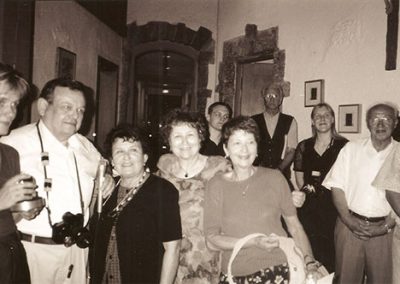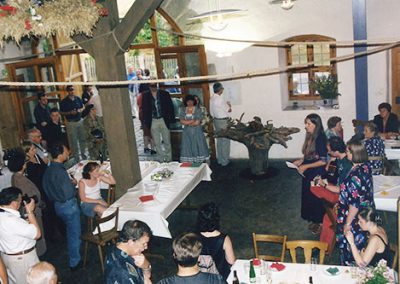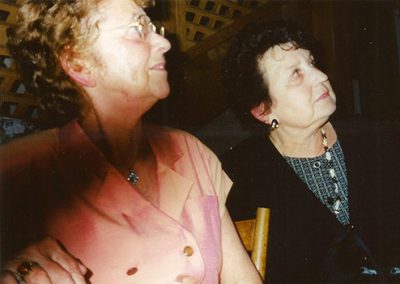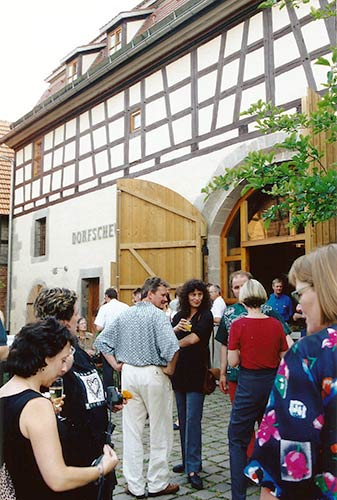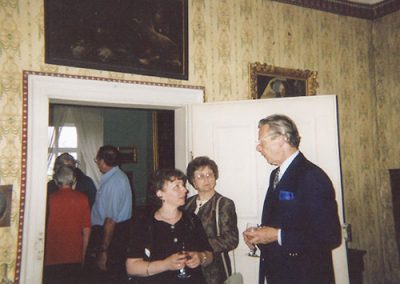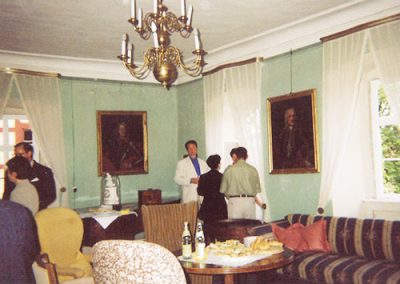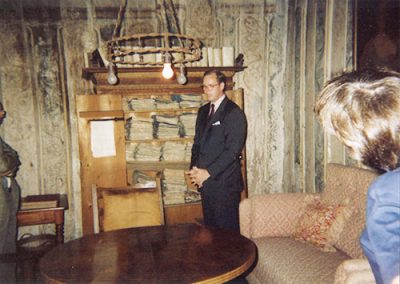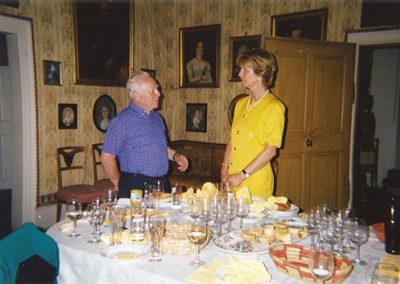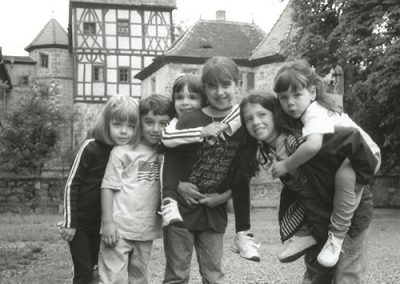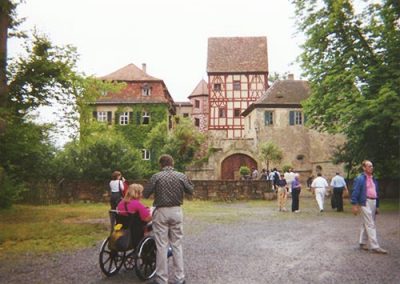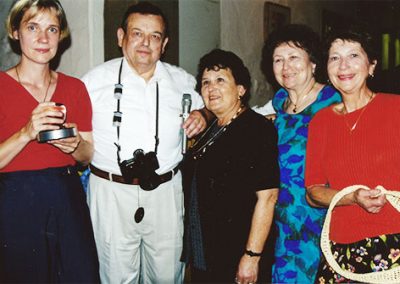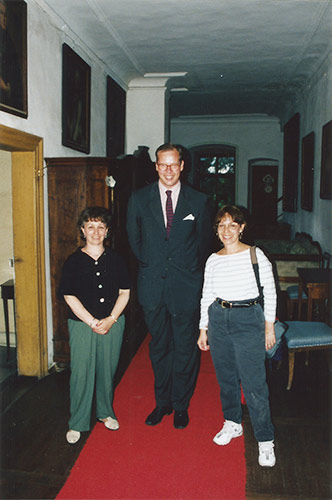Nauman Hess
Lottie Nauman Hess
I was born in 1925 so my earliest recollections of the Hitler times is probably round the time I started school. We had a Jewish school in Unsleben. My father already went to that school. All in one room, well most of the time before Hitler time I think after the fourth grade the children went to Bad Neustadt to a little higher education. We had a teacher was also the cantor in the synagogue. Well the one that when I started school his name was Blumenthal and he retired I think when I was maybe in the second or third grade he retired and went to America.
I know that when we came much later we did see him once, he lived in Brooklyn.
Then we got a teacher named Rosenbaum and he was with us till the end and I understand that he and his wife eventually ended up in a concentration camp and were killed. Anyway, it was very close Jewish community and you know on the orthodox side everybody went to Shul on Shabbat and kept Kosher. I have to say also that many of the families were related. There was a lot of intermarriage you know between the different families.
Synagogue, well, what I remember it was very beautiful. The women were upstairs the men were downstairs and I remember there was a big treat on Simchas Torah, the little girls of which I was one of course were allowed downstairs to walk around with flags and you know, otherwise children were really not supposed to come to synagogue except on Rosh Hashanah, a maid would bring us to the synagogue to hear the Shofar, not into the synagogue, in the foyer where we stood to hear the shofar and then we were taken home.
It was so typically German I think that you know silence must prevail, no fooling around here. Anyway that’s my recollection of the synagogue.
The school, well I was the only one in my class so I was the smartest, and I do remember that our teacher when the Saar, you know the Saar area that is between France and Germany which had I think after World War One had become French but then in the early 30s it was taken back by Germany. And our teacher I guess it might have been at the beginning of Hitler of times but he was unaware of it yet you know he was so proud of Germany to have that Saar back. I don’t know why I remember that so much but you know it left some kind of an impression.
There was a law that all girls had to learn either knitting or crochet or some kind of handiwork. And being we had only a man teacher. On Friday afternoon we had to go to the Christian school to be taught what ever handiwork, you know knitting, embroidery… I don’t know.
So, there were only a handful of us girls, the little ones didn’t have to go if you were only 10 years old, above ten, we had to go to the Christian school. Well first of all the Christian girls were seated by class whereas the Jewish girls were all bunched together, far away from the Christian girls and there was a lot of snickering and making fun of us. There was one girl in particular who had it out for me and she was threatening all kinds of things what she was going to tell what I did. Anyway I was so frightened and of course I didn’t tell my mother anything about it I just every Friday morning I said I had a stomach ache or I am getting a cold or you know anything not to have to go but I always had to go. And oh, another thing, the teacher the woman she came from Bad Neustadt by the way. She must’ve also been a Nazi seeing as how it was Friday afternoon and also in the winter should Shabbat start early so we were allowed to leave a little earlier. She always made a big announcement saying: “The Israelites are gone again”, she made a big thing of that. Remembering, even today, it was a big scare for me. A nightmare.
Most of the Jews that came to America, we all lived in the same neighbourhood. They started up again a synagogue, the Untsleben Congregation started their own synagogue. It was in Queens which is part of New York City, where we all lived within walking distance of each other and many of us were related anyway. And they called it the Elmhurst Jewish Centre because it was in an area called Elmhurst, so we saw each other all the time. The next generation, I guess many moved away. Some became very very Orthodox and they started another congregation, in a different part of Queens which still exists today. One of my mother’s cousins who was more my age, he he became the Rabbi of that Schul. They still exist today.
My mother died in 1991, and it must have been after that that we heard about this congregation in Cleveland, about the Jews that left in 1830, something like that and a cousin of mine somehow found that out – she unfortunately is not living anymore. We got all kinds of papers when they left about who they were, which we had not heard of before. As I say, my parents’ generation was gone, so I couldn’t even ask anyone if they knew about them. I doubt it, because I never heard anything about it. Everybody, at that point or shortly before, was trying to find relatives somewhere in another country to help them get there, and my grandmother, my mother’s mother, had an uncle who had, as a young man, left for America. None of us knew him, of course ; she got in touch with him in the State of Missouri and she asked first for an affidavit for my uncle, who was single, my mother’s brother, and he sent an affidavit, and he came, I think in 1936 or 1937, and then they asked him for an affidavit for our family. He was already in his 80s, and I think he was blind. He said he can’t afford to support a family with three children and he suggested he would send an affidavit for my father, he should come along alone and find a job, and then send for us. So my father left in October 1937 and ten months later, we came. My mother, my brother and sister, and my grandmother.
My father and two of his brothers had a granary which they had inherited from their Father which had been in existence forever. Coming into the town from either side there were signs, from either sides, “Don’t deal with the Jew”, so many of the farmers, they didn’t need that and they were afraid, many continued, many were not afraid and continued, but business went way down. My father’s other brother was a physician, he was the town’s, the country doctor, he went to all the towns around there, and of course his practice went down. He came to America, I think also in 1937, I don’t even know where he got his affidavit from, I’ve no idea, because he was single at the time.
My husband and my brother organised a trip for the whole family, with the children and the grandchildren, to come to Unsleben . We were 26 people, we came together. All this started because my brother is into genealogy. He was in the computer and Angela Bungert somehow found some inquiries on the computer and she was very much interested in what happened to the Jews. I have to say, her family, her mother was a very good friend of my mother’s before Nazi time. She just wanted to know, she got in touch with my brother and somehow the mayor of Unsleben heard about it, and sent us an invitation, and that’s how it all started. Already before that, Prof. Hesselbach, he got in touch with my brother and he wanted to know about my cousin Trudy Naumann, was her name, if she was coming. And at the time she wasn’t sure she was coming, anyways, to make a long story short, when we were in Unsleben, Prof. Hesselbach couldn’t wait to meet Trudy. Trudy was about five or six when she left Unsleben, and he was about the same age as she . He said “I have to ask you something. When we were children we were in the street ” and the mothers were talking to each other and he picked up a pebble in the street and wrapped it in candy wrapper and gave it to her. His mother must have told him afterwards that it was not a nice thing to do. He did it because he knew she was Jewish. And he said, with tears rolling down his eyes said: “Do you forgive me?” And Trudy said, “I don’t remember it.” . I mean, they were five years old! Well, he was just… And to this day he writes to her, when we, from Unsleben, we went to Munich, she gets a bouquet of flowers from him “Please forgive me”. Apparently, all his life he has been worried about it and has tried to make up because he really has done a lot of research and kept in touch with us.
Naumann Hess
I was born in 1925 so my earliest recollections of the Hitler times is probably round the time I started school. We had a Jewish school in Unsleben. My father already went to that school. All in one room, well most of the time before Hitler time I think after the fourth grade the children went to Bad Neustadt to a little higher education. We had a teacher was also the cantor in the synagogue. Well the one that when I started school his name was Blumenthal and he retired I think when I was maybe in the second or third grade he retired and went to America.
I know that when we came much later we did see him once, he lived in Brooklyn.
Then we got a teacher named Rosenbaum and he was with us till the end and I understand that he and his wife eventually ended up in a concentration camp and were killed. Anyway, it was very close Jewish community and you know on the orthodox side everybody went to Shul on Shabbat and kept Kosher. I have to say also that many of the families were related. There was a lot of intermarriage you know between the different families.
Synagogue, well, what I remember it was very beautiful. The women were upstairs the men were downstairs and I remember there was a big treat on Simchas Torah, the little girls of which I was one of course were allowed downstairs to walk around with flags and you know, otherwise children were really not supposed to come to synagogue except on Rosh Hashanah, a maid would bring us to the synagogue to hear the Shofar, not into the synagogue, in the foyer where we stood to hear the shofar and then we were taken home.
It was so typically German I think that you know silence must prevail, no fooling around here. Anyway that’s my recollection of the synagogue.
The school, well I was the only one in my class so I was the smartest, and I do remember that our teacher when the Tzar, you know the Tzar area that is between France and Germany which had I think after World War One had become French but then in the early 30s it was taken back by Germany. And our teacher I guess it might have been at the beginning of Hitler of times but he was unaware of it yet you know he was so proud of Germany to have that Tzar back. I don’t know why I remember that so much but but you know it left some kind of an impression.
There was a law that all girls had to learn either knitting or crochet or some kind of handiwork. And being we had only a man teacher. On Friday afternoon we had to go to the Christian school to be taught what ever handiwork, you know knitting, embroidery… I don’t know.
So, there were only a handful of us girls, the little ones didn’t have to go if you were only 10 years old, above ten, we had to go to the Christian school. Well first of all the Christian girls were seated by class whereas the Jewish girls were all bunched together, far away from the Christian girls and there was a lot of snickering and making fun of us. There was one girl in particular who had it out for me and she was threatening all kinds of things what she was going to tell what I did. Anyway I was so frightened and of course I didn’t tell my mother anything about it I just every Friday morning I said I had a stomach ache or I am getting a cold or you know anything not to have to go but I always had to go. And oh, another thing, the teacher the woman she came from Bad Neustadt by the way. She must’ve also been a Nazi seeing as how it was Friday afternoon and also in the winter should Shabbat start early so we were allowed to leave a little earlier. She always made a big announcement saying: “The Israelites are gone again”, she made a big thing of that. Remembering, even today, it was a big scare for me. A nightmare.
Most of the Jews that came to America, we all lived in the same neighbourhood. They started up again a synagogue, the Untsleben Congregation started their own synagogue. It was in Queens which is part of New York City, where we all lived within walking distance of each other and many of us were related anyway. And they called it the Elmhurst Jewish Centre because it was in an area called Elmhurst, so we saw each other all the time. The next generation, I guess many moved away. Some became very very Orthodox and they started another congregation, in a different part of Queens which still exists today. One of my mother’s cousins who was more my age, he he became the Rabbi of that Schul. They still exist today.
My mother died in 1991, and it must have been after that that we heard about this congregation in Cleveland, about the Jews that left in 1830, something like that and a cousin of mine somehow found that out – she unfortunately is not living anymore. We got all kinds of papers when they left about who they were, which we had not heard of before. As I say, my parents’ generation was gone, so I couldn’t even ask anyone if they knew about them. I doubt it, because I never heard anything about it. Everybody, at that point or shortly before, was trying to find relatives somewhere in another country to help them get there, and my grandmother, my mother’s mother, had an uncle who had, as a young man, left for America. None of us knew him, of course ; she got in touch with him in the State of Missouri and she asked first for an affidavit for my uncle, who was single, my mother’s brother, and he sent an affidavit, and he came, I think in 1936 or 1937, and then they asked him for an affidavit for our family. He was already in his 80s, and I think he was blind. He said he can’t afford to support a family with three children and he suggested he would send an affidavit for my father, he should come along alone and find a job, and then send for us. So my father left in October 1937 and ten months later, we came. My mother, my brother and sister, and my grandmother.
My father and two of his brothers had a granary which they had inherited from their Father which had been in existence forever. Coming into the town from either side there were signs, from either sides, “Don’t deal with the Jew”, so many of the farmers, they didn’t need that and they were afraid, many continued, many were not afraid and continued, but business went way down. My father’s other brother was a physician, he was the town’s, the country doctor, he went to all the towns around there, and of course his practice went down. He came to America, I think also in 1937, I don’t even know where he got his affidavit from, I’ve no idea, because he was single at the time.
My husband and my brother organised a trip for the whole family, with the children and the grandchildren, to come to Unsleben . We were 26 people, we came together. All this started because my brother is into genealogy. He was in the computer and Angela Bungert somehow found some inquiries on the computer and she was very much interested in what happened to the Jews. I have to say, her family, her mother was a very good friend of my mother’s before Nazi time. She just wanted to know, she got in touch with my brother and somehow the mayor of Unsleben heard about it, and sent us an invitation, and that’s how it all started. Already before that, Prof. Hesselbach, he got in touch with my brother and he wanted to know about my cousin Trudy Naumann, was her name, if she was coming. And at the time she wasn’t sure she was coming, anyways, to make a long story short, when we were in Unsleben, Prof. Hesselbach couldn’t wait to meet Trudy. Trudy was about five or six when she left Unsleben, and he was about the same age as she . He said “I have to ask you something. When we were children we were in the street ” and the mothers were talking to each other and he picked up a pebble in the street and wrapped it in candy wrapper and gave it to her. His mother must have told him afterwards that it was not a nice thing to do. He did it because he knew she was Jewish. And he said, with tears rolling down his eyes said: “Do you forgive me?” And Trudy said, “I don’t remember it.” . I mean, they were five years old! Well, he was just… And to this day he writes to her, when we, from Unsleben, we went to Munich, she gets a bouquet of flowers from him “Please forgive me”. Apparently, all his life he has been worried about it and has tried to make up because he really has done a lot of research and kept in touch with us.
The day we arrived in Unsleben
Upon our arrival we were greeted outside the former granary (now town hall) by numerous dignitaries and others. Two young children handed each of us flowers. As we entered the hall a brass band was playing. Tables were set up and artwork much of it specifically designed for this event was displayed.
Once everyone was seated, Mayor Elisabeth Machon and others welcomed us. Then the four native born Unslebeners presented Angela Bungert with a crystal apple representing New York City. In the black and white photo Angela is holding the apple. To her left are Fred Nauman and his sisters, Lottie Naumann Hess and Ruth Naumann Derison, and their cousin Trudy Naumann Dreyer.
To the right in a white shirt is Herr Professor Hesselbach. In the photo of the two women are my mother, Lottie Hess and Angela's mother, Irmgard Bungert. That day they were reunited after more than 60 years. They had been childhood playmates. I remember hearing stories as a child about one gentile family that let their children play with the Jewish children until they left. Those were Angela’s grandparents.
Wasserschloss’ 99 visit
Photos from ’99 visit. These are from evening at the Schloss.
Photo marked ‘Wasserschloss’ shows our arrival. We have no idea who the woman at the gate was. The group of children were the youngest in our party.
Rebecca Derison, Alex Koenig, Samantha Derison, Kaitlyn Koenig, Emma Dreyer, Makenzie Nauman
Photo marked ‘Wasserschloss 2’. Top photo is a better one than I sent previously of the presentation of the crystal apple.
Bottom photo is the young Count with my sister Dianne on the right and me on the left. At the time the Count was recently engaged. I believe that he and his wife and children now live in the Wasserschloss. They have converted part of the schloss into a B&B. My parents and I stayed there in 2006.
Photo marked ‘Wasserschloss dinner’ are photos from the buffet dinner prior to the concert.
top left: Ruth Naumann Derison and myself talking to Herr Christoph Graf zu Waldburg Wolfegg
top right: Werner Hess (my father) talking to the Countess
bottom right: young Graf showing our group documents. As I recall he showed us some of the documents and told us of the history of the relationship between the Barons (his ancestors) and the Jews of Unsleben. He told us that up until Hitler his family had always been able to protect the Jews from those wishing to do harm.
(FYI, the elder Graf was originally a Baron until he married ‘up’ to the Countess when he became a Count.)
Wasserschloss-2
